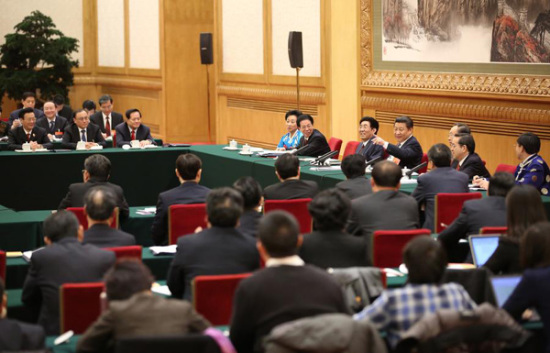
Chinese President Xi Jinping (back, 4th R) joins a panel discussion with deputies to the 12th National People's Congress (NPC) from northeast China's Jilin province during the third session of the 12th NPC, in Beijing, capital of China, March 9, 2015. (Photo/Xinhua)
The Communist Party of China ("CPC") just did what it has never done before, and it is important to appreciate what happened and why. It happened in New York, at BookExpo America where an unprecedented series of five books, titled Understanding the CPC, was published in English by the CPC's Organization Department. I am not a dispassionate observer: I wrote the Introduction to the books and gave a speech at the book launch.
Many foreigners do not understand the CPC - particularly its historic transformation from a "revolutionary party" seeking power to a ruling party exercising power. The CPC has ruled China since 1949; it has more than 85 million members. Why then is the Party such a mystery? Perhaps remembrances of the collapsed Soviet Communist Party, hidden and sclerotic, or of China during the "cultural revolution" (1966-76), fanatical and chaotic? Perhaps the Party's sense of secrecy? Whatever the reasons, the veil should be lifted.
Top leader Xi Jinping says that for China to achieve its goals of building a moderately prosperous society by 2020 and a fully modernized nation by 2050 - which defines the Chinese Dream - the Party must rule China, and rule itself with discipline, dedication and competence. Party effectiveness, Xi said, "should ultimately be measured by the real benefits the people have reaped, by the improvement in their lives and by how well their rights and interests are protected".
"Strictly governing the Party", one of Xi's "Four Comprehensives", has become a signature policy, the power to energize and implement the other three comprehensives: building a moderately prosperous society, deepening reform, and governing according to law. Here then is the nexus between Xi's Four Comprehensives and Understanding the CPC - both of which reflect Xi's commitment to Party power and purity.
To understand the CPC, I suggest an eight-dimensional framework: ideology and its developments; history and its legacies; leadership and elite politics; structure and organization; personnel selection and training; discipline and anti-corruption; contemporary challenges and future prospects.
One question, often asked by the international media, is "If China's one-party system is so good, why does China impose strict media regulations?" This is a larger discussion, with arguments related to imbalances in economics and education and the priority of China's developmental needs, but here I give the flow of the answer: Because improving living standards depends on development, development on stability, stability on one-party rule, and one-party rule on stricter media regulations, therefore improving living standards depends on strict media regulations.
If one looks at almost every aspect of real life, Chinese people have more personal freedom today than at any other time in their long history. Moreover, China's vast population is finally free from widespread famine, pestilence, homelessness, illiteracy, political mass movements, and the social scourges of other eras. And as for involving citizens in the process of governance, the government is developing innovative uses of the internet, social media and public polling to solicit feedback and assess opinions.
While I argue that a one-party system is optimal for China today, I therefore stress that the CPC has a higher standard of accountability to enhance personal welfare in the broadest sense, which includes transparency in governance, public oversight of government, rule of law, increasing democracy, various freedoms, and human rights.
The CPC claims a historic mission. In 1,000 years, when the long annals of political systems are compiled, China today may well be a case study of what happens when a country with a one-party political system seeks to construct a prosperous, democratic society.
I credit the CPC for publishing Understanding the CPC. If the world does not understand the CPC, do not blame foreign media or conjure up conspiracy theories. The best response is to engage in the world marketplace of ideas. That's what this new book series does, offering a clear, comprehensive description of the CPC by the CPC.
The author Robert Lawrence Kuhn is an international corporate strategist and political/economics commentator.
















































